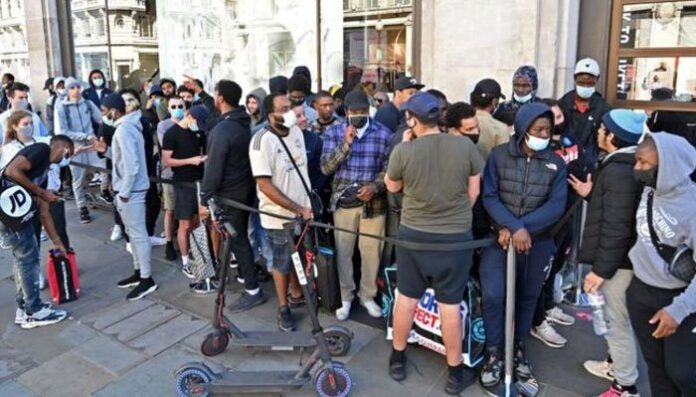برطانیہ:غیر ضروری چیزوں کی دُکانیں کھلتے ہی لوگوں کا ہجوم بڑھ گیا
برطانیہ میں تین ماہ کی بندش کے بعد ، غیر ضروری اسٹورز کے باہر لوگوں کی لمبی لمبی لائنیں لگ گئیں۔
ایک بار برطانیہ میں خریداری کی اجازت ملنے کے بعد ، آکسفورڈ اسٹریٹ اور لندن کے دیگر علاقوں میں دکانوں کے باہر ہجوم جمع ہوگیا۔ خریداری کرنے والے لوگوں کی صبح سے ہی دکانوں کے سامنے لمبی لمبی قطاریں لگ گئیں۔
بہت سی جگہوں پر معاشرتی فاصلے کو بھی نظرانداز کیا گیا ہے۔ برطانیہ میں ، فارمیسی ، گروسری اور فوڈ اسٹورز کے سوا تمام اسٹورز 23 مارچ سے بند تھے۔
دوسری طرف ، آج سے یوروپی یونین کی داخلی سرحدیں کھل گئیں ، جس کے نتیجے میں بہت سارے یورپی ممالک کے شہریوں کو بغیر کسی رکاوٹ کے اپنے پڑوسی ممالک میں داخلے کی اجازت مل گئی ہے۔
اس سلسلے میں موصولہ اطلاعات کے مطابق ، یورپی کمیشن کی ہدایت پر عالمی کوروانا وائرس کے پھیلاؤ کو روکنے کے لئے سفری پابندیاں ختم کردی جائیں گی۔
معمولاتِ زندگی ور معاشی سرگرمیوں کی بحالی کے لئے سب سے پہلے یورپ کی داخلی سرحدیں کھول دی گئیں۔
بیلجیم ، فرانس ، جرمنی ، جمہوریہ چیک ، ڈنمارک اور یونان نے آج اپنی سرحدیں کھولیں۔ اٹلی ، جو کورونا وائرس سے سب سے پہلے اور شدید متاثر ہے ، نے پہل کی اور 3 جون کو اپنے پڑوسیوں سمیت تمام یورپی سیاحوں کے لئے اپنی سرحدیں کھول دی۔
اسی طرح بلغاریہ ، کروشیا ، ہنگری ، لٹویا ، لتھوانیا ، ایسٹونیا ، سلوواکیہ اور سلووینیا نے ہمسایہ ممالک کے لئے سفری پابندیوں میں نرمی لینا شروع کردی ہے۔
آسٹریا 16 جون سے 31 ممالک کے لئے اپنی سرحدیں کھول رہا ہے۔ ایک ہی وقت میں ، کچھ ممالک کی پالیسی یہ ہے کہ وہ اُن ممالک کے ساتھ سفر آسان کریں جو انہیں ایک جیسی سہولیات کی پیش کش کرتے ہیں۔ کیونکہ ابھی بھی کچھ یورپی ممالک میں یہ خدشات موجود ہیں کہ وہاں کورونا وائرس کا مکمل خاتمہ نہیں ہوا ہے۔
یاد رکھنا یہ یورپ میں سیاحوں کا موسم ہے۔ یورپ میں ، 2،3 ملین بڑی اور چھوٹی کمپنیاں سیاحت کے کاروبار میں سرگرم عمل ہیں اور 12.3 ملین افراد کو ملازمت فراہم کرتی ہیں۔ 2018 میں ، سیاحت کے شعبے نے یورپی جی ڈی پی کا 3.9 فیصد حصہ لیا۔ تاہم ، دوسرے شعبوں کے فوائد کے ساتھ مل کر ، یہ یورپی جی ڈی پی کا 10.3 فیصد بنتا ہے ، جس میں 27.3 ملین افراد روزگار رکھتے ہیں
After three months of closure in the UK, long queues of people formed outside the non-essentials shops.
As soon as shopping was allowed in the UK, crowds gathered outside shops in Oxford Street and other areas of London. People eager to shop had formed long queues outside the shops since early morning.
Social distance was also overlooked in many places. In the UK, all shops except pharmacies, food and essentials shops have been closed since March 23.
On the other hand, the internal borders of the European Union have started to open from today, after which the citizens of many European countries will be able to enter their neighboring countries without any hindrance.
According to the information available in this regard, at the direction of the European Commission, in the month of March this year, the travel restrictions imposed to prevent the spread of the global pandemic Covid-19 are being lifted.
Under the directive, Europe’s internal borders are being opened for the first time to restore normalcy and economic activity.
Belgium, France, Germany, the Czech Republic, Denmark and Greece are opening their borders today. Italy, the first and most affected country by the corona virus, took the initiative and opened its borders to all European tourists, including its neighbors, on June 3.
Similarly, Bulgaria, Croatia, Hungary, Latvia, Lithuania, Estonia, Slovakia and Slovenia have begun easing travel restrictions for neighboring countries.
Austria has been opening its borders to 31 countries since June 16. At the same time, the policy of some countries is to facilitate travel with countries that provide them with the same facilities. Because there are some countries in Europe where there are still concerns that the corona virus has not been completely eradicated.
Remember that this is the tourist season in Europe. In Europe, 2.3 million companies, large and small, are involved in the tourism business, employing 12.3 million people. In 2018, the tourism sector accounted for 3.9% of European GDP. But if the sector is combined with the benefits of other sectors, it makes up 10.3% of European GDP, which employs 27.3 million people.






















